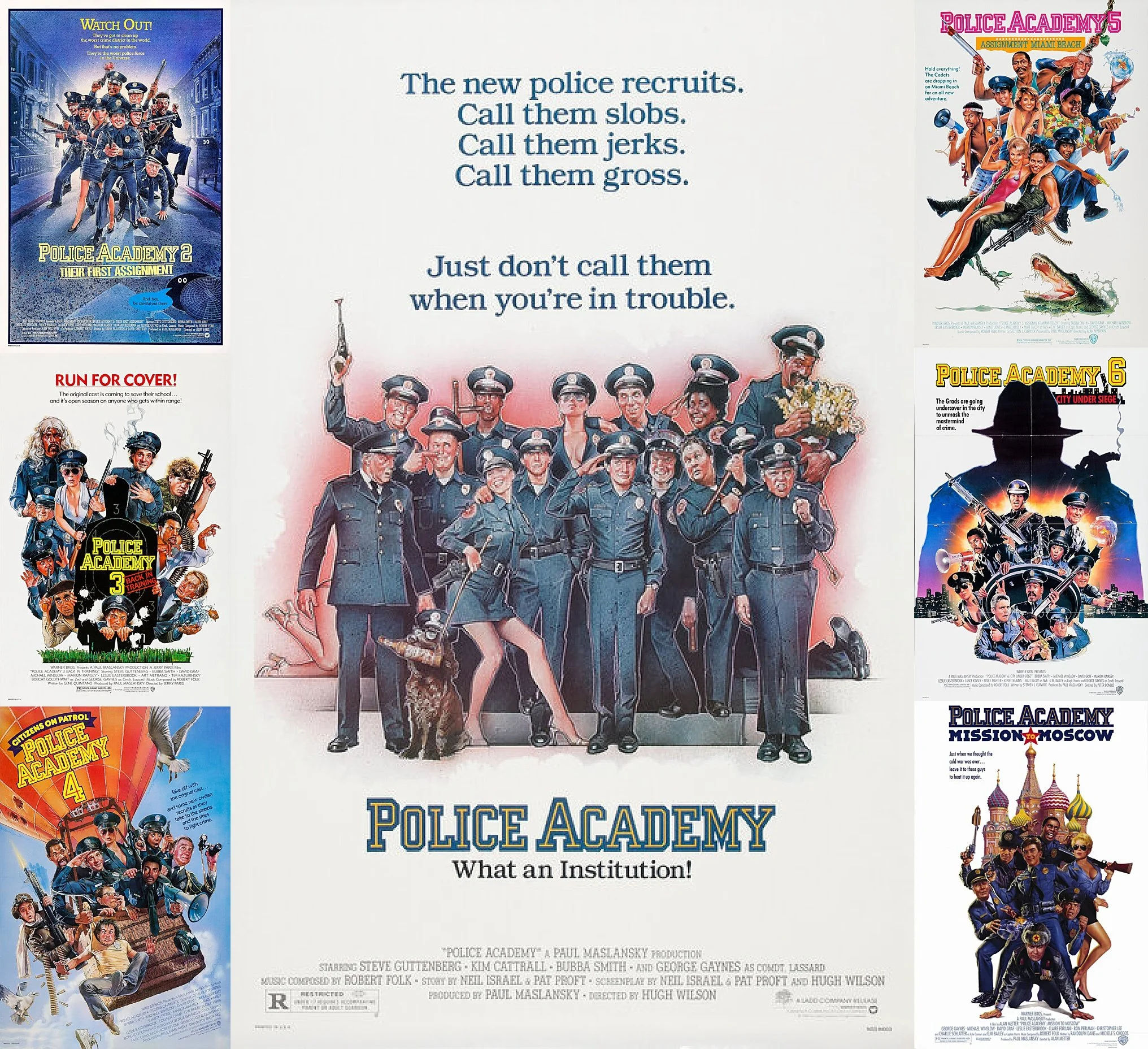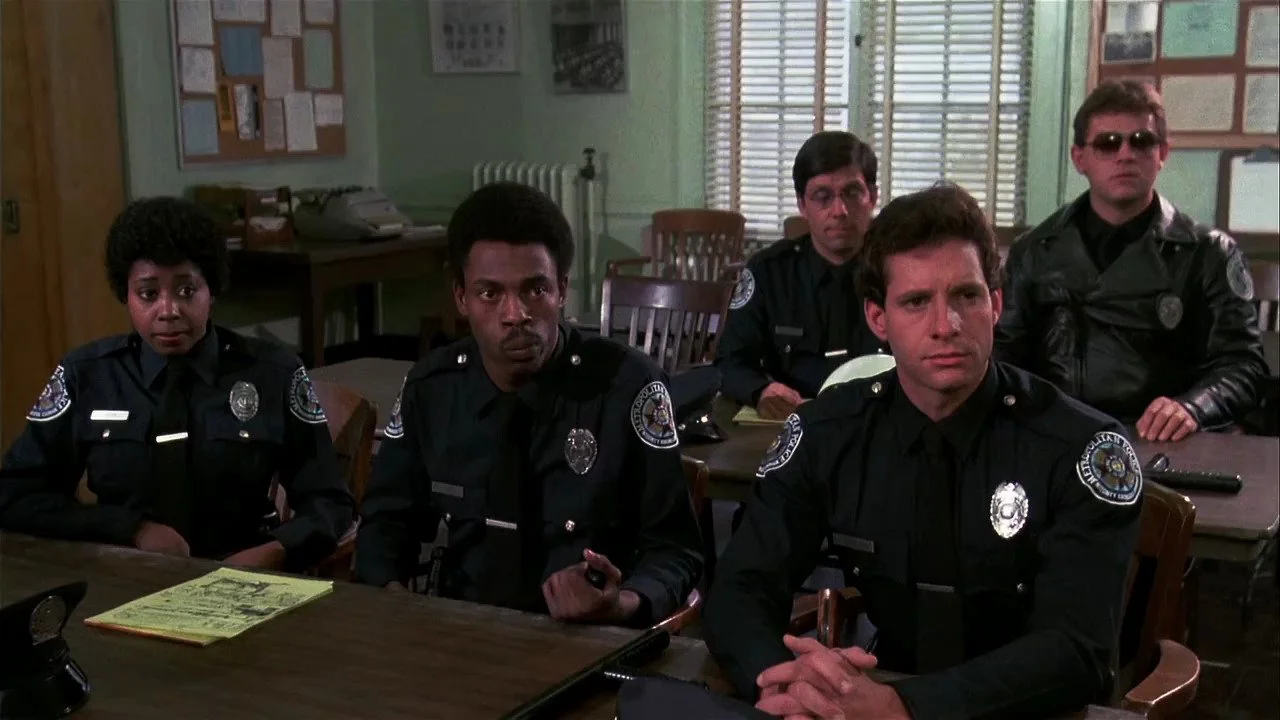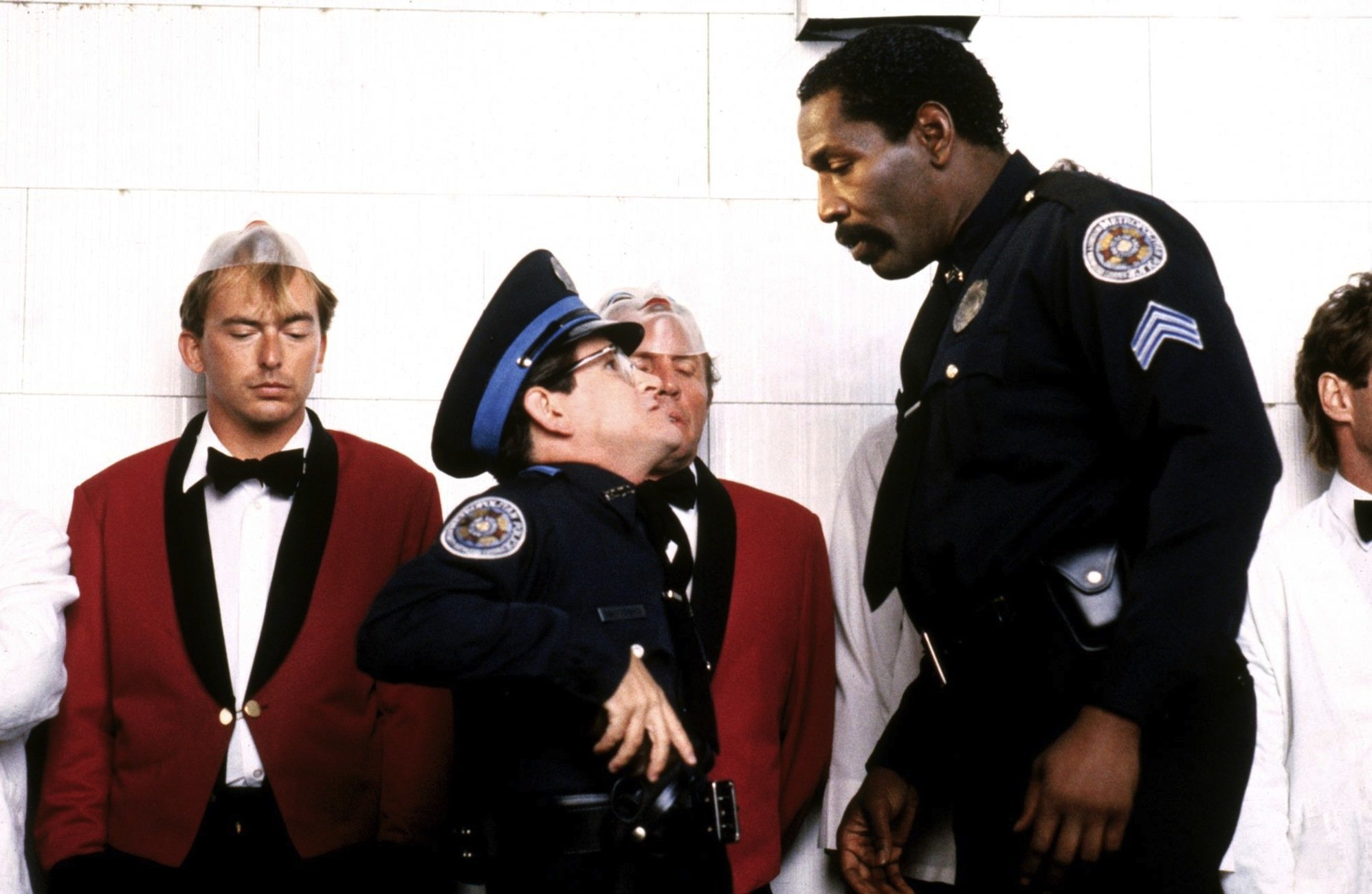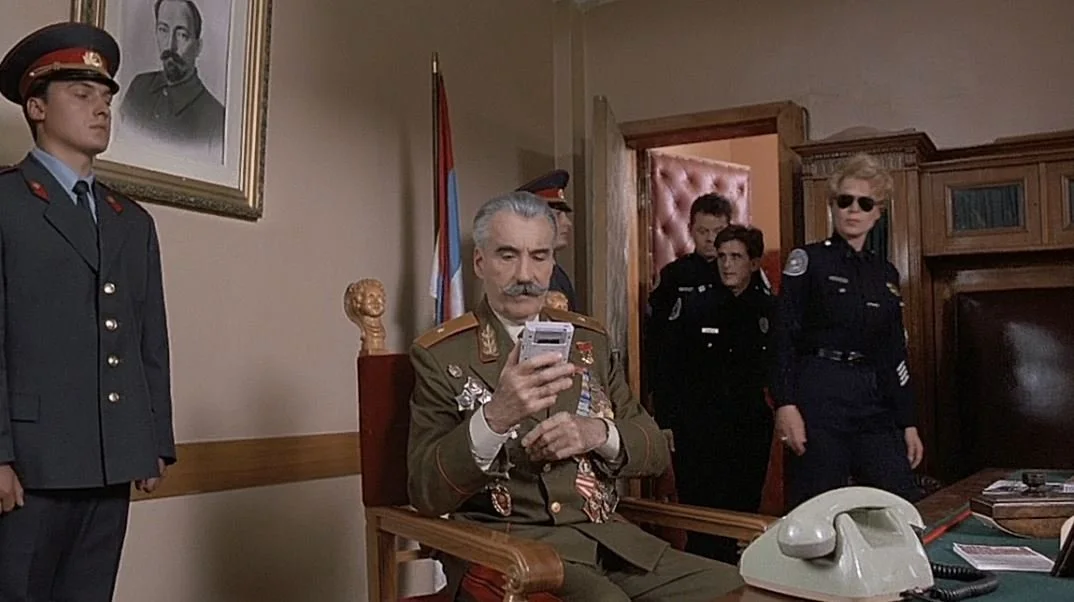Police Academy: A Review
As a child of the ‘80s I grew up on a couple of the Police Academy movies. There were no less than 7 Police Academy movies, most of which were released annually starting in 1984. They were cheap to produce and made a lot of money most of the time. While I saw most of the installments from the ‘80s, I probably saw the 4th through the 6th films the most. Because they were such a big part of what made up the film landscape of the ‘80s I became very fond of several of the characters in my childhood.
But I haven’t seen any of the Police Academy movies really in over 30 years. So, when a Blu-ray box set was recently released I became curious about these slapstick comedies. Do any of them hold up? Are any of them actually any good? How offensive are they today? When I asked my Instagram Followers near the beginning of the month which movie franchise I should focus on this month, the vast majority voted for the Police Academy movies. So, here I am reviewing and ranking all 7 films in the franchise.
Police Academy (1984)
The concept of Police Academy was inspired by real events that occurred in San Francisco. The mayor wanted to open the enrollment of the local police academy to include anyone, regardless of height, weight, whatever. They apparently really needed bodies. A sergeant of the academy reportedly told producer Paul Maslansky that they had to accept anyone who enrolled, but would wash out the less ideal recruits. This got Maslansky thinking. What if they all graduated? The idea was pitched to Alan Ladd, Jr. and writers were hired to go to work on a script. Now, the original script was apparently much more in the vein of Animal House, Meatballs, Porky’s… movies along those lines stuffed with sex jokes and perverted behavior. The creator of the TV series WKRP in Cincinnati, Hugh Wilson, was hired to direct. But he was put off by the vulgar humor and preferred to ground the comedy in realistic situations. This version of the script was apparently rejected and a compromise between the two versions was reached and shot.
That background explains a lot about the original Police Academy movie. On the one hand it’s a film with a great concept that allows for several colorful and distinct characters and a lot of silliness. But then the film has characters peering into a ladies’ locker room, a character sneaking his way into the girl dorms, and a few low-brow gags like a surprise blowjob during a speech. That’s why the original Police Academy is the only entry to earn an R rating. It’s also a bit of a comedic potpourri that isn’t as scattershot as a couple of the sequels would be, but is tonally uneven.
The cast of characters are abundant, but mostly make the movie: Leslie Barbara (Donovan Scott), an overweight man who is tired of being pushed around by a local gang, Blankes (Brant Von Hoffman) and Copeland (Scott Thomson), who suck up to a lieutenant by attempting to cause other recruits to quit; Debbie Callahan (Leslie Easterbrook), a no-nonsense sergeant at the academy; Douglas Fackler (Bruce Mahler), an accident-prone husband, Lieutenant Harris (G.W. Bailey), a hard-nosed trainer at the academy who wants to wash out as many of the unusual recruits as possible and is the butt of many jokes and gags; Moses Hightower (Bubba Smith), a tall and muscular florist-turned-recruit; Laverne Hooks (Marion Ramsey), a soft-spoken and petite gal who finds her authoritative voice at the academy; Larvell Jones (Michael Winslow), a loud mouth in the literal sense of the word in that he can imitate any sound and pulls several pranks; Commandant Eric Lassard (George Gaynes), the dim, but lovable head of the academy; Carey Mahoney (Steve Guttenberg), a privileged, yet lovable smart ass who is forced to go to the academy or else face prison time; George Martin (Andrew Rubin), a womanizing recruit; Eugene Tackleberry (David Graf), a war vet and gun nut; and Karen Thompson (Kim Cattrall), a rich young woman who wants to contribute to her community by becoming a police officer and is Mahoney’s love interest. Interestingly, a handful of future stars were considered for the role of Mahoney: Tom Hanks, Michael Keaton, and Bruce Willis.
That’s quite the list of colorful characters and actors. And they are a big piece of what makes this movie work and why the sequels have any appeal at all. I think, aside from the competing comedic styles, one of the biggest issues with the movie is it sets up the entire plot with text! Why couldn’t they have a 5-minute scene with the mayor that shows us the setup instead of telling us the setup? It’s odd.
The year 1984 is widely considered one of the best years in film thanks to such releases as Beverly Hills Cop, Ghostbusters, and The Karate Kid - films that resonate with audiences still today. Alas, the first Police Academy, while a decent comedy that was one of the highest-grossing films of the year, can’t be claimed among the standouts that helped make 1984 as great a year in film as it was. It simply suffers a bit from its mixed comedic stylings, never committing to one direction or another, and using text to build the story’s plot.
Police Academy 2: Their First Assignment (1985)
A sequel was churned out within a year of the original’s release. The budget was bigger, but that wasn’t because of any advancements in the production quality; the original was filmed in Toronto, whereas the sequel was filmed in the more expensive Los Angeles. According to producer Paul Malansky that accounts for roughly $6 million of the budget (the original’s total budget was $4.5 million). On top of that the returning cast desired pay raises, which accounted for another $1.5 million. In this film, ironically due to budget cuts, the police chief (George Robertson) is considering closing the city’s worst precinct, which happens to be headed by Commandant Lassard’s brother, Pete (Howard Hesseman). A few of the graduating recruits from the first film are sent by the Commandant to provide the precinct with extra assistance. However, an underhanded lieutenant (Art Metrano) is promised a promotion to captain if Pete Lassard fails to turn the precinct around.
About half of the previous cast returns for this sequel and they happen to make up most of the cast’s strongest members: Mahoney (Guttenberg, who returned reluctantly), Jones (Michael Winslow), Fackler (Bruce Mahler), Hightower (Bubba Smith), Hooks (Marion Ramsey), Tackleberry (David Graf), and, of course, Lassard (George Gaines). Two other strong members of the cast - Harris (G.W. Bailey) and Callahan (Leslie Easterbrook) - would return in later sequels. This film adds Hesseman, Metrano, and eventual series regular Sergeant Proctor (Lance Kinsey). Bobcat Goldthwait plays the villain here, Zed, the leader of a gang terrorizing the city. And Tim Mazurinsky joins as shop owner Carl Sweetchuck. Both of them would show up in sequels, just wait. Colleen Camp also jumps aboard as Tackleberry’s new partner, who he has more than he expects in common and she’s a welcome addition.
Most of the new additions are welcome replacements for those who didn’t return from the original. Metrano is no Bailey, though. While he is the target of many gags by Mahoney and Jones, his flavor of smarm just doesn’t compare to Bailey’s ability to relish in authority and ass-kissing those above him.
The film climaxes with the gang of bumbling officers raid the hideout of Zed’s gang, which gives the precinct the kudos it needs to stay active. Most of the film works, but it’s definitely at this point that you’re either jumping on the wavelength of these movies or not: they are intended to be silly, harmless fun. As long as the jokes are mostly inoffensive and the filmmaking is watchable then everything is just fine.
Police Academy 3: Back in Training (1986)
This is where we run into trouble.
So, the production went back to Toronto, which apparently is obvious throughout the film for anyone familiar with the city. However, the budget still ballooned to nearly twice as much as the last movie. I can’t comprehend how that’s possible, because there’s nothing about Back in Training that really warrants an extra $5+ million, especially if it’s cheaper to shoot in Toronto than in Los Angeles.
In this film it isn’t a precinct that’s in danger of being shut down, rather the team’s own police academy. There is a competing academy now apparently run by Mouser, who became Commandant between films, I guess. Mouser and Proctor try their best to make Lassard’s academy look bad for a review committee while Lassard’s favorite graduates from Their First Assignment take time out of their week to assist their favorite academy. Blankes (Brant Von Hoffman) and Copeland (Scott Thomson) from the original film return to secretly aid Mouser in his schemes. Callahan (Leslie Easterbrook) also returns this time. Sweetchuck and Zed both return as cadets of Lassard’s academy. Pretty much everyone else at the academy is forgettable.
This film, more than the others, is a string of gags stitched together with little cohesiveness. It even repeats a couple of the same gags and scenes from the first movie! It climaxes with a chase sequence involving robbers who kidnap the governor. These bad guys have nothing to do with anything in the rest of the movie and don’t even appear until at least an hour into the movie. They just exist to generate something akin to excitement and some sort of finale.
Worse than that, the jokes in Back in Training are just plain bad. It’s not just that a portion of the film’s comedy leans into Asian stereotypes and is in poor taste. It’s that even if you set those scenes aside, the film is full of gags and jokes that just aren’t that funny. So, the entire affair is poorly made, poorly written, with no comedy or memorable scenes to make it all worth anyone’s time. It’s unfortunate, because the films so far have different screenwriters every time (the writer of this film also wrote the next film) and director Jerry Paris managed to do a serviceable job with Their First Assignment. It all goes off the rails somehow in every way here.
Police Academy 4: Citizens on Patrol (1987)
In order to improve the relationship between the police force and the community Commandant Lassard comes up with a program where citizens work with the police force. How exactly this program works or how it’s different from a community watch program isn’t made clear. It’s just a means to introduce more characters and silliness.
Pretty much everyone from the last movie except Fackler (Bruce Mahler) returns with the addition of Sharon Stone as a reporter, David Spade and Brian Backer as skateboarders who join the program in lieu of prison time, and Billie Bird, Tab Thacker, Derek McGrath, and Corinne Bohrer as members of the C.O.P. program. Most of them are welcome additions to the cast. G.W. Bailey returns as now Captain Harris and Scott Thomson returns as Sergeant Copeland.
The main problem with Citizens on Patrol is there’s just too many characters. Most people like Colleen Camp, whose character and her family returns, just get one scene or two in the 88-minute runtime. So, several interesting and enjoyable characters and actors get introduced, but have very little to do.
In addition to that there is no coherent plot. The script is about as scattered as the crooks who break out of jail near the end. So, it gets tough to care about the film beyond a series of 2-minute sketches with a scattershot success record.
As for the jokes and gags, most of them are at the expense of Sweetchuck or Thacker’s House. Of course, Bailey’s Harris exists to be a pebble in everyone’s shoe and becomes the target of adolescent hijinks, as well, such as yet another bullhorn gag. The humor is mostly harmless and silly slapstick, but even Laurel and Hardy produced more laughs in 5 minutes than the entirety of this film.
Citizens on Patrol is a comedy that goes nowhere with its concept (it’s forgotten in the next movie) with no cohesive conflict and a series of criminals that once again appear near the end of the movie. It’s a film that’ll appeal to grade school and preteen adolescents, but few others. The cast is the only thing that makes the film watchable, however most of them are wasted.
Police Academy 5: Assignment Miami Beach (1988)
In the fifth film in the comedy series Commandant Lassard is being both celebrated and forced into retirement. There’s a police convention in Miami and Lassard is being awarded the highest honor. Unfortunately, once he returns he’s being forced to retire due to a legal age requirement. The usual bunch head to Miami to help celebrate. Meanwhile, a jewel thief accidentally swaps bags with Lassard and makes several attempts to get his merchandise back.
This is easily one of the best movies in the series. That may be a bold statement for some, but the main reason is simply because the script by Stephen Curwick (Family Ties) is the most consistent and cohesive since maybe the original film. It has a decent plot with a villain story that is consistent throughout and not as random as in the past few movies. Rene Auberjonois stars as the villain Tony and is a huge strength of this film. He knows the tone to strike and hits his lines with a perfect balance of cartoon villainy and Miami sleaze. In fact, one of the highlights of the movie is when Lassard is kidnapped. His kidnappers, led by Tony, confer with Lassard (who thinks the whole thing is an exercise) about the best escape plans. The rapport between Gaynes and Auberjonois is one of the biggest delights in the entire series.
Another improvement with this film is the cast is cut in half from Citizens on Patrol. That allows us to focus on Callahan, Tackleberry, Jones, House, Hightower, Hooks, Harris, and Proctor. The other side of that is we lost Mahoney (Guttenberg had scheduling conflicts due to Three Men and a Baby), Sweetchuck, Zed, Laura, Mrs. Feldman, and Colleen Camp’s Lieutenant Kirkland-Tackleberry. Those were all great characters, but they’re mostly not missed since we have more time with the characters that are left. Also, Matt McCoy and Janet Jones are new additions that we could’ve done without. McCoy plays Lassard’s nephew as a Mahoney replacement, but he’s pretty mediocre and adds nothing to the plot. Jones plays Officer Stratton, who mostly exists for McCoy to drool over, but does continue the series’s tradition of tough women.
All in all, Assignment Miami Beach is better than most of its predecessors in the Police Academy series. A lot of the jokes are mildly amusing at most, but there’s still more strengths with the script and cast than can be said of the other films.
Police Academy 6: City Under Siege (1989)
There’s a series of bank robberies in one area of the city by a handful of elusive criminals. Lassard’s team attempts to catch the bad guys, but there may be something more going on then they realize.
City Under Siege is a pleasant surprise. It brings back Mrs. Feldman (albeit briefly and inexplicably under a new name) and the obliviously accident-prone Fackler. Much like Assignment Miami Beach it has an actual plot with a conflict and set of villains for our wacky team of officers to deal with. In this case, there’s a secret bad guy akin to Inspector Gadget’s Dr. Claw and three stooges who do the dirty work for him. That trio (Garrit Graham, Brian Seeman, Darwyn Swalve) is probably the funniest villains of the series and has actual distinct characteristics just like the police force characters. On top of that you have the great Kenneth Mars as the city’s mayor, whose oratory skills leave something to be desired. This is the first movie in the series where the mayor plays an important role on screen, which is notable because the first film was set up by the mayor’s actions, but explained in text rather than acted out on camera. And Mars shines in this film and is even an improvement over Auberjonois in the last movie. It’s astonishing to me that the film received unanimous reviews that called it “insidious”, “diabolically inspired”, and “an endless living death”.
What isn’t great is Matt McCoy is back this time. His character worked for the Miami Police Department in the last film and there is no attempt to explain how or why he transferred to the unnamed city of the series. It’s not even like he adds so much to the film that we’re glad to have him back, regardless of how. He still fails to contribute much and is a milquetoast version of Mahoney. Also, this is the first film to remove Lassard completely from the context of the Police Academy and be put in charge of a precinct with no new recruits from the academy. In Assignment Miami Beach, the story begins at the academy and moves to Miami for a convention that honors Lassard, so that had a logic to it. Not so in City Under Siege.
Now, this film cost $15 million, making it one of the most expensive entries in the series. Part of that is because it filmed in Los Angeles, which is known to be very expensive to shoot in, despite references to Toronto where other entries were shot. But partly because of that, this movie had a smaller profit margin than the previous films. It also simply didn’t perform well, making a little over $30 million - enough to break even. This was also the last film to include Hooks, Hightower, Proctor, and Lieutenant Hurst. Nick Lassard and Fackler also wouldn’t return.
I’d say they all went out on a relative high note for the series. Maybe it should’ve ended here.
Police Academy: Mission to Moscow (1994)
After a 5-year hiatus the long-running comedy film series was back! It was directed by Alan Metter, who directed Rodney Dangerfield’s Back to School! It co-starred Christopher Lee and Ron Perlman! It features the debut of Claire Forlani! Just because it was only released in one theater and therefore made just over $125,000 doesn’t mean it’s a bad movie, right?
No, it’s really bad.
The critical beating that City Under Siege received is much more appropriate for this horrendous piece of garbage.
So, there’s a mafia boss (Ron Perlman) in Russia that’s laundering money through a video game that’s clearly a substitute for the Game Boy’s Tetris, which had Russian origins and was a massive hit in the years between this film and the last one. Anyway, supposedly the game has coding that allows it to take down security systems, which would somehow lead the mob boss to take control of the Kremlin… Right, so a Russian Commandant (Christopher Lee) decides his police force can’t resolve this issue without the help of Americans and requests the help of Lassard and his team.
Okay, so this film takes the cake in terms of the most ridiculous plot of any Police Academy movie. That’s bad enough. The execution is far, far worse. I was beginning to think after enjoying City Under Siege so much that maybe the film series was wearing me down. Were these actually terrible movies and I had become brainwashed by them and accepted them? Mission to Moscow answers “Nyet!” like a ton of bricks.
The film incessantly relies on dubbed and cartoon noises that the actors are obviously not making, as well as absurd acrobatics as comedy. It’s like the director had never seen any Police Academy movies, never seen any comedy film ever, and only ever seen Looney Tunes cartoons and thought that was what a comedy is. It would be one thing if the film had been handed off to a new filmmaker. But it wasn’t! Alan Metter is not exactly an A-list comedy director, but he worked with Steve Martin, Rodney Dangerfield, and almost directed a project with Sam Kinison! He directed Girls Just Want to Have Fun and Richard Pryor’s Moving!
This film is absolutely baffling! There is not a single moment in this film that is comedically sound. Part of the point of the film even seems to be to see how many fluids they could pour on poor G.W. Bailey. It’s embarrassing. It’s also one of those movies where the villain holds a 3.5 computer disk and declares “The world is mine!”, which is amusing in 2024.
No, the Police Academy series has had its stinkers. But nothing is as unbearable or awful as Mission to Moscow. The year 1994 was a great year in film, but it had some rough watches like Lightning Jack, Clifford, Highlander III, and City Slickers II. Police Academy: Mission to Moscow is the hail mary bomb of them all, a film that is a failure in every imaginable way.
There’s been talk since 1994 of an eighth film. What that looks like has evolved over time from a sequel to a remake to a legasequel. I do actually think the original film is one of the only known titles that I would encourage a remake of. I don’t think the goal would be to create the same cast of characters. I think a new cast of characters with distinct amusing personalities would be a smart way to go. Maybe Guttenberg or Winslow would be interested in a cameo or with Bailey as the new Commandant (although Bailey is now older than Gaines was at the end of the film series). But I do think there are a lot of comedic possibilities that avoids the racism, stereotyping, and male gaze of the original series and adds character or thematic depth instead.
Unfortunately, much of the cast of the original film series has since passed away: David Graf (Tackleberry), Bubba Smith (Hightower), Marion Ramsey (Hooks), George Gaynes (Lassard), George Robertson (Hurst), Andrew Rubin (Martin in the original), Billie Bird (Feldman), and Tab Thacker (House). It’s astounding and a bummer for anyone who grew up with these films since many of them died fairly young.
The Police Academy film series is a unique product of the ‘80s and its Modern Age of filmmaking. What’s surprising is despite being a product of its time it managed to consistently feature women who were tough and competent in spite of the male gaze and misogyny surrounding them. That’s quite unexpected. It also has the unique distinction of being one of the only comedies with more than 2 sequels. Only the Pink Panther beats it to this day with 8 sequels. That alone is notable and makes Police Academy stand apart even if none of the films achieved comedy greatness. But these films are descendants of the Keystone Cop movies and slapsticks like those by Laurel and Hardy. While they may not have much to say, the best films do operate on a level that is silly amusement meant to provide some laughs and cheer one up for a while. The cast and the characters were always their saving grace during the series’s heyday, making even the least of them watchable. Except Mission to Moscow.
The Ranking:
Police Academy
Police Academy 6: City Under Siege
Police Academy 2: Their First Assignment
Police Academy 5: Assignment Miami Beach
Police Academy 4: Citizens on Patrol
Police Academy 3: Back in Training
Police Academy: Mission to Moscow
What do you think? Have you seen all of the Police Academy movies? If so, do you agree with my reviews and rankings? Which is your favorite? Who are your favorite characters? Comment below.








